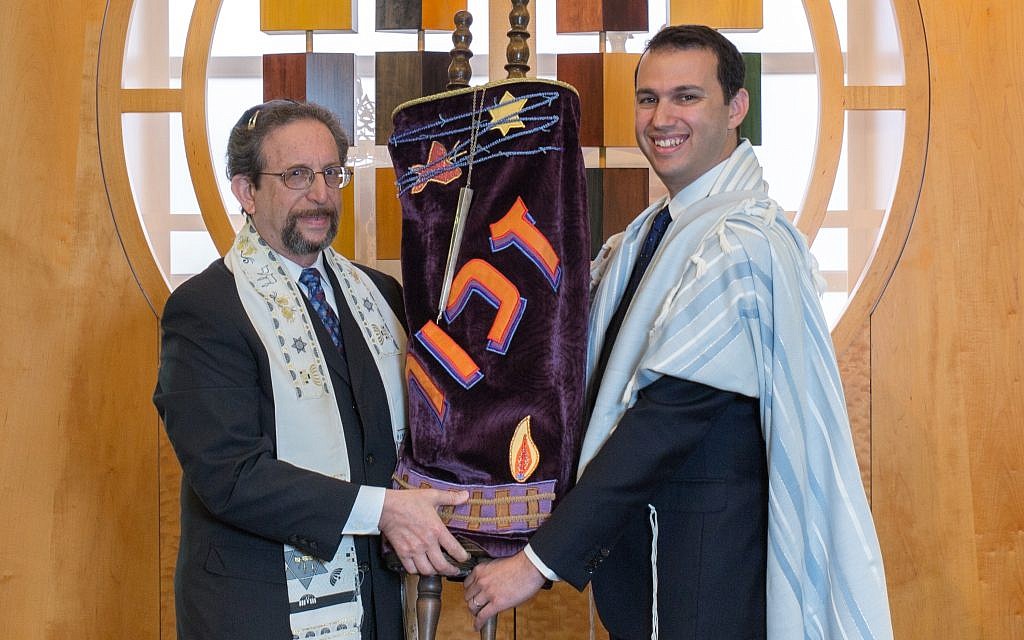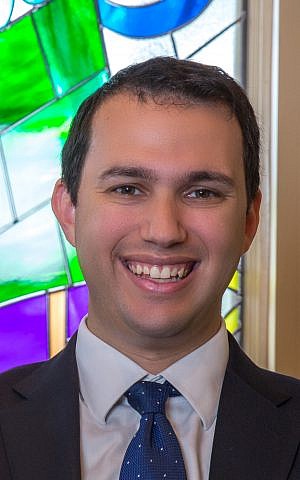Temple Kehillat Chaim Welcomes New Rabbi
Rabbi Jason Holtz is taking over from Rabbi Harvey Winokur, who founded and served TKC for the past 42 years.

Rabbi Jason Holtz was born and grew up in a Jewish home. But after joining his high school’s youth group, he became more passionate about Judaism. That experience led him to build relationships and ultimately become Temple Kehillat Chaim’s new rabbi.
Holtz is taking over from Rabbi Harvey Winokur, who founded TKC 42 years ago and served as rabbi for 36 years. Winokur has assumed emeritus status.
Originally from Daytona Beach, Fla., Holtz grew up in a very small Jewish community. His parents raised him to be Jewish at Temple Beth El, where he attended Sunday school, yet he never felt it was his choice until he joined the youth group. His best friend joined it, and although Holtz was initially hesitant, he decided to give it a try.
Get The AJT Newsletter by email and never miss our top stories Free Sign Up
Holtz didn’t choose to become a rabbi right then, he said, but the experience shaped his ideology toward Judaism. After high school Holtz attended Syracuse University, where he majored in international studies with a double major in philosophy.
Part of what peaked Holtz interest to delve into Judaism more he said, was the religion itself. “I just loved being Jewish, and for me, the first time that occurred was being part of my high school’s youth group. … I felt like I was discovering Judaism for the first time as a teenager and looking through a more mature lens. I thought, this is something I want to learn more about. But I think what really made me want to become a rabbi is definitely the relationships,” Holtz said.
While in college Holtz went on Birthright and enrolled in Judaic studies and rabbinic literature. He also studied abroad at Tel Aviv University and Hebrew University in Jerusalem during the second Intifada. Upon graduation, Holtz attended rabbinical school at the Hebrew Union College in Jerusalem and Cincinnati.
Taking his first pulpit in 2010, he lived in Tucson, Ariz., where he served as the assistant rabbi at Temple Emanu-El for three years. He recalled fond memories of his time there. “I was fresh out of rabbinic school and excited to do my job, which gave me a lot of opportunities to meet people, to teach and to try things I had learned about in the classroom,” he said.
In 2013, Holtz resettled in London to become the rabbi at Bromley Reform Synagogue. He recounted the similarities and differences between European and American Jewry. “People always asked me how it was driving on the left side of the road and I would reply that I got that pretty quick. It’s lifting the Torah scroll and the reading (which was heavily influenced by Sephardic customs) that threw me off. But it also allowed me to understand that different places have different ways of doing things and understanding that it is not wrong, but a part of the beautiful diversity and tapestry of the Jewish community that is out there,” Holtz said.
After living in London for five years, Holtz with his wife, Jodi, and 17-month old son, Asher, were ready to move back to America. Holtz was already familiar with the Roswell synagogue after Winokur reached out to him in 2014. Temple Kehillat Chaim and Brombley Reform Synagogue both have custody of two separate scrolls from Bzenec, and Rabbi Winikur, knowing this reached out to Holtz in order to bring the two congregations together for a trip to central Europe.
Holtz was added to TKC’s Facebook page, in 2014 but learned about the rabbinical position through the Central Conference of Rabbinical Rabbis. And on July 6, the rare scrolls were passed from Winokur to Holtz in a symbolic ceremony. A formal installation will take place in the fall.
About assuming Winokur’s position, Holtz said, “I am not just following a rabbi, I am following the founder of the temple. … For me this is humbling, and I feel grateful and honored for the trust that has been placed in me,” he said. Winokur, who is emeritus rabbi, said in a statement, “I would urge Holtz to find the way to honor the past while putting his imprint on a pathway to a future.”

As Holtz looks to that future, he hopes to make the most of learning opportunities for people and to build connections. “I want to create opportunities for people to meet one another and to get to know people in the community and their congregation…I really do see this as more than just a temple; I see it as a community, which is what kehillah means,” he said.
Yet as Holtz shoulders his new position, he also realizes there will be challenges along the way. “We live in a time where people don’t automatically choose to join a temple or even be Jewish despite what their family history might be. It’s always a choice for people and some people can’t count on this and say, ‘I have to really work for it,’ but I actually see it as more of an opportunity that we get to teach the relevance of Torah, which is what we are here for anyway,” Holtz said.
Holtz said one of his first goals is to get to know everyone in the community. “I am not coming here with some agenda to make them into something that they are not or somewhere that they don’t want to go. So right now, I am shaking a lot of hands, meeting and talking to a lot of people. I want to get to know what their hopes and dreams are, what their vision is for the future, and see what we can make happen,” he said.




comments